- Home
- Kim Newman
The Man From the Diogenes Club Page 36
The Man From the Diogenes Club Read online
Page 36
The last snowman was Bee-Alice. As they passed, it reared up like a kid pretending to be a monster, and stuck out yard-long pseudopods of gleaming ice, barbed with jagged claws. Then it retracted its arms and silently chortled at the shivering humans.
‘That one’s a comedian,’ said Cleaver. ‘You have to watch out.’
Leech squeezed past the Professor, into the building. Richard looked at the five snowmen, now immobile and innocent-seeming.
‘Come on, whoever you are,’ urged Cleaver. ‘What are you waiting for? Chwistmas?’
Richard slipped off his sun-visor, then followed Leech.
II.
‘You in the van, wakey-wakey,’ shouted someone, who was also hammering on the rear doors. ‘The world needs saving…’
‘Again?’ mumbled Jamie Chambers, waking up with another heat-headache and no idea of the time. Blackout shields on the windows kept out the daylight. Living in gloom was part of the Shade Legacy. He didn’t even need Dad’s night-vision goggles – which were around here somewhere – to see well enough in the dark.
He sorted through stiff black T-shirts for the freshest, then lay on his back and stuck his legs in the air to wriggle into skinny jeans. Getting dressed in the back of the van without doing himself an injury was a challenge. Sharp metal flanges underlay the carpet of sleeping bags, and any number of dangerous items were haphazardly hung on hooks or stuffed into cardboard boxes. When Bongo Foxe, the drummer in Transhumance, miraculously gained a girlfriend, he’d tactfully kicked Jamie out of the squat in Portobello Road. The keys and codes to Dad’s old lair inside Big Ben were around somewhere, but Jamie could never get used to the constant ticking. Mum hated that too. Between addresses, the Black Van was his best option.
‘Ground Control to Major Shade,’ called the hammerer, insistent and bored at the same time. Must be a copper.
‘Hang on a mo,’ said Jamie, ‘I’m not decent.’
‘Hear that, Ness?’ said the hammerer to a (female?) colleague. ‘Shall I pop the lock and give you a cheap thrill?’
One of the few pluses of van living, supposedly, was that gits like this couldn’t find you. Jamie guessed he was being rousted by gits who could find anybody. For the second time this week. He’d already listened to Leech’s twist, Heather Wilding. This’d be the other shower, the Diogenes Club. One of the things Jamie agreed with his father about was that it made sense to stay out of either camp and make your own way in the night.
Even parked in eternal shadow under railway arches, the van was like a bread oven with central heating. The punishing summer continued. After seconds, his T-shirt was damp. Within minutes, it’d be soaked and dried. This last six weeks, he’d sweated off pounds. Vron was freaked by how much his skeleton was showing.
He ran fingers through his crispy shock of raven hair (natural), checked a shaving mirror for blackheads (absent), undid special locks the hammerer oughtn’t have been able to pop, and threw open the doors.
A warrant card was held in his face. Frederick Regent, New Scotland Yard (Detached). He was in plainclothes – blue jeans, red Fred Perry (with crimson sweat-patches), short hair, surly look. He couldn’t have been more like a pig if he’d been oinking and had a curly tail. The girlfriend was a surprise – a red-haired bird with a Vogue face and a Men Only figure. She wore tennis gear – white plimsolls, knee-socks, shorts cut to look like a skirt, bikini top, Cardin cardigan – with matching floppy hat, milk-blank sunglasses (could she see through those?) and white lipstick.
‘I’m Fred, this is Vanessa,’ said the Detached man. ‘You are James Christopher Chambers?’
‘Jamie,’ he said.
Vanessa nodded, taking in his preference. She was the sympathetic one. Fred went for brusque. It was an approach, if tired.
‘Jamie,’ said Fred, ‘we understand you’ve come into a doctorate?’
‘Don’t use it,’ he said, shaking his head. ‘It was my old man’s game.’
‘But you have the gear,’ said Vanessa. She reached into the van and took Dad’s slouch hat off a hook. ‘This is a vintage “Dr Shade” item.’
‘Give that back,’ said Jamie, annoyed.
Vanessa handed it over meekly. He stroked the hat as if it were a kitten, and hung it up again. There was family history in the old titfer.
‘At his age, he can’t really be a doctor,’ said Fred. ‘Has there ever been an Intern Shade?’
‘I’m not a student,’ he protested.
‘No, you’re one of those dropouts. Had a place at Manchester University, but left after a term. Couldn’t hack the accents oop North?’
‘The band was taking off. All our gigs are in London.’
‘Don’t have to justify your life-choices to us, mate. Except one.’
Fred wasn’t being quite so jokey.
‘I think you should listen,’ said Vanessa, close to his ear. ‘The world really does need saving.’
Jamie knew as much from Heather Wilding. She’d been more businesslike than this pair, drenched in Charlie, cream suit almost-invisibly damp under the arms, two blouse buttons deliberately left unfastened to show an armoured white-lace foundation garment.
‘The other lot offered a retainer,’ he said. ‘Enough for a new amp.’
‘We heard you’d been approached,’ said Vanessa. ‘And were reluctant. Very wise.’
Wilding hinted Transhumance might be signed to a Derek Leech label. They didn’t only put out moaning hippie box sets and collected bubblegum hits.
‘You won’t need an amp in the ice age,’ said Fred. ‘They’ll be burning pop groups to keep going for a few more days.’
‘Yeah, I’m already shivering,’ said Jamie, unpicking wet cotton from his breastbone. ‘Chills up my spine.’
‘All this heat is a sign of the cold, they say.’
‘You what?’
Fred cracked a laugh. ‘Trust us, there could be a cold spell coming.’
‘Roll on winter, mate.’
‘Careful what you wish for, Jamie,’ said Vanessa.
She found his dad’s goggles in a box of eight-track tapes, and slipped them over his head. He saw clearly through the old, tinted glass.
‘Saddle up and ride, cowboy,’ she said. ‘We’re putting together a posse. Just for this round-up. No long-term contract involved.’
‘Why do you need me?’ he asked.
‘We need everybody,’ said Fred, laying a palm on the van and wincing – it was like touching a griddle. ‘Especially you, shadow-boy. You’ve got a license to drive and your own transport. Besides standing on the front lines for democracy and decent grub, you can give some of your new comrades a lift to the front. And I don’t mean Brighton.’
Jamie didn’t like the sound of this. ‘What?’ he protested.
‘Congratulations, Junior Shade. You’ve got a new backing group. Are you ready to rock and – indeed – roll?’
Jamie felt that a trap had snapped around him. He was going into the family business after all.
He was going to be a doctor.
III.
Inside the research station, crystals crunched underfoot and granulated on every surface. White stalactites hung from door-frames and the ceiling. Windows were iced over and stunted pot-plants frostbitten solid. Even lightbulbs had petals of ice.
Powdery banks of frost (indoor rime? snow, even?) drifted against cabinets of computers. Trudged pathways of clear, deep footprints ran close to the walls, and they kept to them – leaving most of the soft, white, glistening carpet untouched. Richard saw little trails had been blazed into the rooms, keeping mainly to the edges and corners with rare, nimbler tracks to desks or workbenches. The prints had been used over again, as if their maker (Professor Cleaver?) were leery of trampling virgin white and trod carefully on the paths he had made when the cold first set in.
The Professor led them through the cafeteria, where trestle tables and chairs were folded and stacked away to clear the greatest space possible. Here, someone had been playing – making snow-angels,
by lying down on the thick frost and moving their arms to make wing-shapes. Richard admired the care that had been taken. The silhouettes – three of them, with different wings, as if writing something in semaphore – matched Cleaver’s tubby frame, but Richard couldn’t imagine why he had worked so hard on something so childish. Leech had said he didn’t employ frivolous people.
If anything, it was colder indoors than out. Richard felt sharp little chest-pains when he inhaled as if he were flash-freezing his alveoli. His exposed face was numb. He worried that if he were to touch his moustache, half would snap off.
They were admitted to the main laboratory. A coffee percolator was frosted up, its jug full of frothy brown solid. On a shelf stood a goldfish bowl, ice bulging over the rim. A startled fish was trapped in the miniature arctic. Richard wondered if it were still alive – like those dinosaurs they found in the 1950s. Here, the floor had been walked over many times, turned to orange slush and frozen again, giving it a rough moon-surface texture. Evidently, this was where the Professor lived.
Richard idly fumbled open a ring-binder that lay on a desk, and pressed his mitten to brittle blue paper.
‘Paws off,’ snapped Cleaver, snatching the file away and hugging it. ‘That’s tip-top secwet.’
‘Not from me,’ insisted Leech, holding out his hand. ‘I sign the cheques, remember. You work for me.’
If Derek Leech signed his own cheques, Richard would be surprised.
‘My letter of wesignation is in the post,’ said Cleaver. He blinked furiously when he spoke, as if simultaneously translating in Morse. Rhotacism made him sound childish. How cruel was it to give a speech impediment a technical name sufferers couldn’t properly pronounce? ‘I handed it to the postman personally. I think he twied to deliver it to you outside. Vewy dedicated, the Post Office. Not snow, nor hail, and so on and so forth.’
Leech looked sternly at the babbling little man.
‘In that case, you’d better hand over all your materials and leave this facility. Under the circumstances, the severance package will not be generous.’
Cleaver wagged a shaking hand at his former employer, not looking him in the eye. His blinks and twitches shook his whole body. He was laughing.
‘In my letter,’ he continued, ‘I explain fully that this facility has declared independence from your organisation. Indeed, fwom all Earthly authowity. There are pwecedents. I’ve also witten to the Pwime Minister and the Met Office.’
Leech wasn’t used to this sort of talk from minions. Normally, Richard would have relished the Great Enchanter’s discomfort. But it wasn’t clear where his own – or, indeed, anybody’s – best interests were in Ice Station Sutton Mallet.
‘Mr Leech, I know,’ said Cleaver, ‘not that we’ve ever met. I imagine you thought you had more important things to be bothewing with than poor old Clever Dick Cleaver’s weather wesearch. Jive music and porn and so forth. I hear you’ve started a holiday company. Fun in the sun and all that. Jolly good show. Soon you’ll be able to open bobsled runs on the Costa Bwava. I’m not surprised you’ve shown your face now. I expected it and I’m glad you’re here. You, I had planned for. No, the face I don’t know… don’t know at all… is yours.’
Cleaver turned to Richard.
‘Richard Jeperson,’ he introduced himself. ‘I’m from—’
‘The Diogenes Club!’ said Cleaver, viciously. ‘Yes, yes, yes, of course. I see the gleam. The wighteous gleam. Know it of old. The insuffewability. Is that fwightful Miss Cathewina Kaye still alive?’
‘Catriona,’ corrected Richard. ‘Yes.’
Currently, Catriona Kaye was Acting Chairman of the Ruling Cabal of the Diogenes Club. She had not sought the position. After the death of Edwin Winthrop, her partner in many things, no one else had been qualified. Richard was not yet ready to leave active service, and had a nagging feeling he wouldn’t be suited to the Ruling Cabal anyway. There was talk of reorganising – ‘modernising’ – the Club and some of their rivals in Whitehall were bleating about ‘accountability’ and ‘payment by results’. If it weren’t arcanely self-financing, the Club would have been dissolved or absorbed long ago.
‘If it weren’t for Cathewina Kaye, and a disservice she did me many many years ago, I might have taken a diffewent path. You know about this, Mr Jeperson?’
A penny, long-teetering at the lip of a precipice, dropped – in slow motion, setting memory mechanisms ticking with each turn.
‘Richard Cleaver? Clever Dick. You called yourself Clever Dick. That’s who you are!’
‘That’s who I was… until that w-woman came along. She hates people like me… like both of you, pwobably… she only likes people who are n-normal. People who can’t do anything. You know what I mean. Normal.’
He drew out the word, with contempt. Richard remembered a time – at school, as a young man – when he might have given the word such a knife-twist. Like Dick Cleaver, he had manifested a Talent early. While Cleaver demonstrated excess brain capacity, Richard showed excess feeling. Insights did not always make him happy. Ironically, it was Catriona – not his father or Edwin Winthrop – who most helped him cope with his Talent, to connect with people rather than become estranged. Without her, he might be a maniac.
‘It was never about who you were, Cleaver,’ said Richard, trying to be kind. ‘It was about what you did.’
Fury boiled behind Cleaver’s eyes.
‘I didn’t do anything! We were the Splendid Six, and she took us apart, one by one, working in secwet with your dwatted Diogenes Club. We were hewoes – Blackfist, Lord Piltdown, the Blue Stweak – and sh-she made us small, twied to make us normal. I’m the last of us, you know. The Splendid One. The Bwightest Boy in the World. The others are all dead.’
Cleaver was coming up to pensionable age, but he was as frozen inside as his goldfish – still eleven, and poisonous.
‘If I suffered a speech impediment like yours, I’d avoid words like “dratted”,’ commented Leech. ‘All this ancient history is fascinating, I’m sure. I know who you used to be, Professor. I don’t hire anyone without knowing everything about them first. But I don’t see what it has to do with all this… this cold business.’
A sly look crept into Cleaver’s eye. An I-know-a-secret-you’re-not-going-to-like look.
‘I wather think I’ve pwoved my point, Mr Leech. You’ve wead my book, The Coming Ice Age?’
‘I had someone read it and summarise the findings for me,’ said Leech, off-handedly. ‘Very convincing, very alarming. It’s why you were headhunted – at a salary three times what you got at the Met – to head my weather research programme.’
What exactly had Derek Leech been doing here? Scientific weather control? For reasons which were now all too plain, Richard did not like the notion of a Great Enchanter with command over the elements.
‘I employ the best, and you were the best man for this job. What you did as a schoolboy was irrelevant. I didn’t even care that you were mad.’
Clever Dick Cleaver sputtered.
‘Sorry to be blunt, pal, but you are. I can show you the psych reports. Your insanity should not have hindered your ability to fulfil your contract. Quite the contrary. Derek Leech International has a policy of easing the lot of the mentally ill by finding them suitable positions. We consider it our social service remit, repaying a community that has given us so much.’
Richard knew all about that. Myra Lark, acknowledged leader in the field of shaping minds to suit the requirements of government and industry, was on Leech’s staff. Some jobs you really had to be mad to take. Dr Lark’s, for instance.
‘Your book convinced me it could happen. World Cooling. And only drastic action can forestall the catastrophe. With the full resources of DLI at your disposal, I was expecting happier results. Not this… this big fridge.’
Cleaver smiled again.
‘If you’d actually wead my book, you wouldn’t be so surpwised. Tell him, Jeperson.’
Leech looked at Richard,
awaiting enlightenment.
‘Professor Cleaver writes that an imminent ice age will lead to worldwide societal collapse and, in all probability, the extinction of the human race.’
‘Yes, and…?’
‘He does not write that this would be a bad thing.’
Realisation dawned in Leech’s eyes. Cleaver grinned broadly, showing white dentures with odd, cheap blue settings.
Derek Leech had given his weather control project to someone who wanted winter to come and freeze everything solid. Isidore Persano and his worm would be proud.
‘What about the snowmen?’ Leech asked.
‘I was wondewing when you’d get to them. The snowmen. Yes. I’m not alone in this. I have fwiends. One fwiend, mainly. One big fwiend. I call her the Cold. You can call her the End.’
IV.
He was supposed to park outside the Post Office Tower and wait for the other recruits. One of the group would have further instructions and, he was promised, petrol money. Jamie was off to the Winter War.
Now he’d (provisionally) taken the Queen’s Shilling, he wondered whether the Diogenes Club just wanted him as a handy, unpaid chauffeur, ferrying cannon fodder about. Dad wouldn’t have thought a lot of that. Still, Jamie only wanted to dip a toe in the waters. He was leery about the shadow life. The Shade Legacy hadn’t always been happy, as Mum would tell him at the drop of a black fedora with razors in the brim. At the moment, he was more interested in Transhumance – especially if they could find a better, preferably celibate drummer… and a new bass-player, a decent PA and enough songs to bump up their set to an hour without reprises. Vron had been promising new lyrics for weeks, but said the bloody heat made it hard to get into the proper mood. Perhaps he should scrub Transhumance and look for a new band.
The GPO Tower, a needle bristling with dish-arrays, looked like a leftover design from Stingray. The revolving restaurant at the summit, opened by Wedgy Benn and Billy Butlin, stopped turning in 1971, after an explosion the public thought was down to the Angry Brigade. Jamie knew the truth. His father’s last ‘exploit’ before enforced retirement had been the final defeat of his long-time enemies, the Dynamite Boys. The Tower was taken over by the now-octogenarian Boys, who planned to use the transmitters to send a coded signal to activate the lizard stems of every human brain in the Greater London area and turn folks into enraged animals. Dad stopped them by setting off their own bombs.

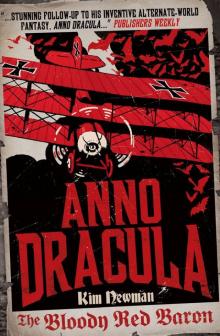 The Bloody Red Baron
The Bloody Red Baron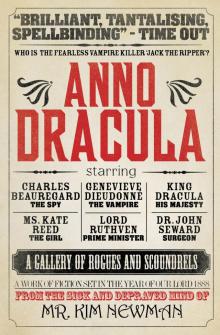 Anno Dracula
Anno Dracula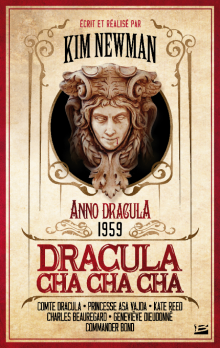 Dracula Cha Cha Cha
Dracula Cha Cha Cha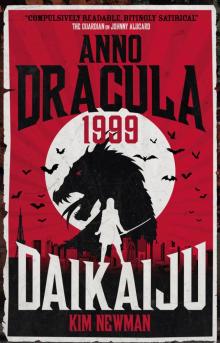 Anno Dracula 1999
Anno Dracula 1999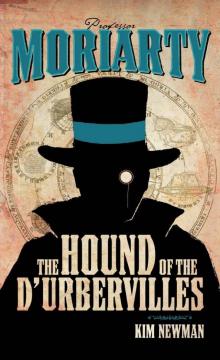 Moriarty: The Hound of the D'Urbervilles
Moriarty: The Hound of the D'Urbervilles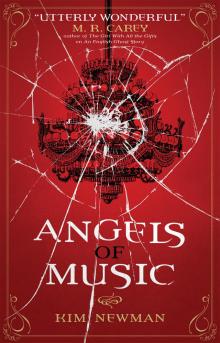 Angels of Music
Angels of Music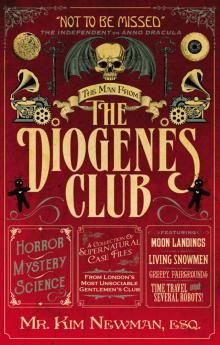 The Man From the Diogenes Club
The Man From the Diogenes Club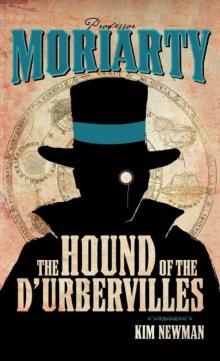 Professor Moriarty: The Hound Of The D’urbervilles
Professor Moriarty: The Hound Of The D’urbervilles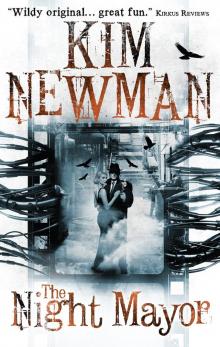 The Night Mayor
The Night Mayor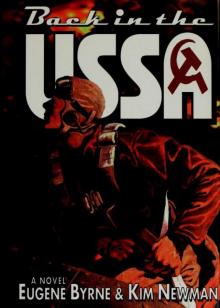 Back in the USSA
Back in the USSA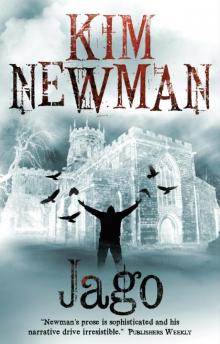 Jago
Jago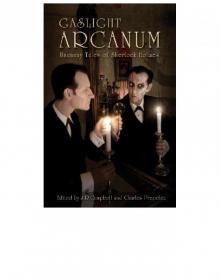 Gaslight Arcanum: Uncanny Tales of Sherlock Holmes
Gaslight Arcanum: Uncanny Tales of Sherlock Holmes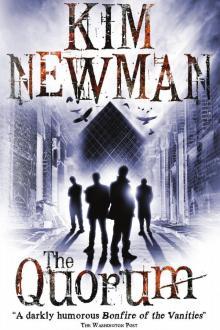 The Quorum
The Quorum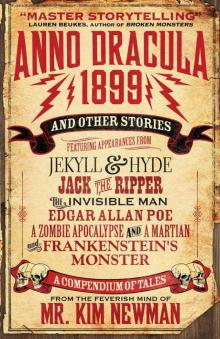 Anno Dracula 1899 and Other Stories
Anno Dracula 1899 and Other Stories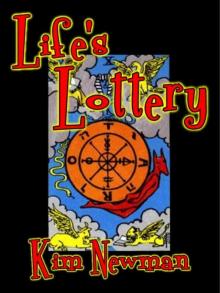 Life's Lottery
Life's Lottery The Secrets of Drearcliff Grange School
The Secrets of Drearcliff Grange School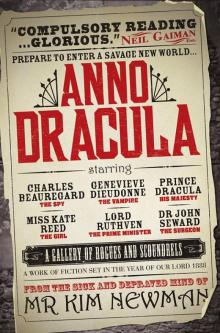 Anno Dracula ad-1
Anno Dracula ad-1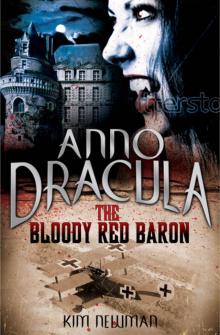 The Bloody Red Baron: 1918 ad-2
The Bloody Red Baron: 1918 ad-2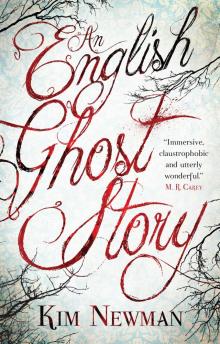 An English Ghost Story
An English Ghost Story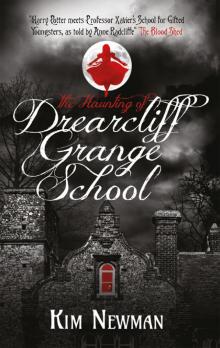 The Haunting of Drearcliff Grange School
The Haunting of Drearcliff Grange School The Other Side of Midnight
The Other Side of Midnight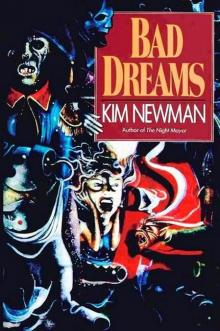 Bad Dreams
Bad Dreams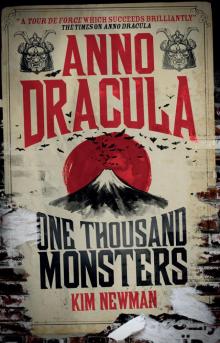 Anno Dracula--One Thousand Monsters
Anno Dracula--One Thousand Monsters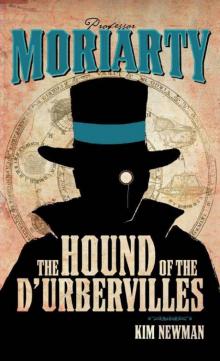 The Hound Of The D’urbervilles
The Hound Of The D’urbervilles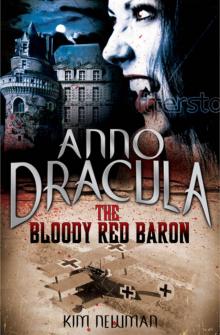 The Bloody Red Baron: Anno Dracula 1918
The Bloody Red Baron: Anno Dracula 1918